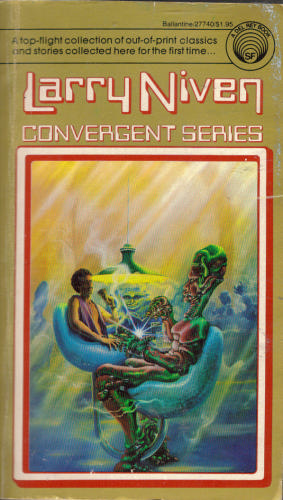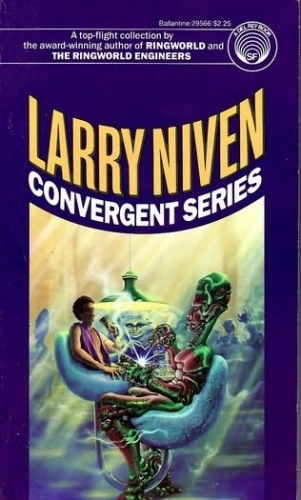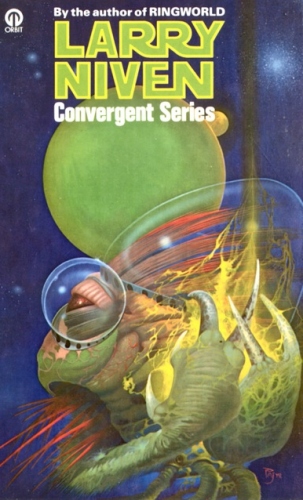The Golden Age of Science Fiction: Convergent Series, by Larry Niven
The Locus Awards were established in 1972 and presented by Locus Magazine based on a poll of its readers. In more recent years, the poll has been opened up to on-line readers, although subscribers’ votes have been given extra weight. At various times the award has been presented at Westercon and, more recently, at a weekend sponsored by Locus at the Science Fiction Museum (now MoPop) in Seattle. The Best Collection Award was first presented in 1975, when it was won by Fritz Leiber for The Best of Fritz Leiber. Up until that year an award was presented for best reprint anthology/collection, with that award’s final winner also being announced in 1974. In 1980. The Locus Poll received 854 responses.
By 1979, Larry Niven had already delved deep into his Known Universe series, publishing World of Ptaavs, Ringworld, A Gift from Earth, Protector, and Ringworld Engineers as well as numerous stories that had been collected in Tales of Known Space in 1975. Niven was so associated with these stories that when he published the collection Convergent Series in 1979, which did not include any Known Space stories, he felt the need to spell the lack of connection out in the afterword to the first story, “Bordered in Black,” which had the feel, if not the details, of a Known Space story.
In fact, Convergent Series is a strange sort of partial reprint. Niven published the collection The Shape of Space in 1969. That book contained four Known Space stories, one Gil Hamilton story, and seven unrelated stories. The Known Space stories and Gil Hamilton stories were reprinted in Tales of Known Space and The Long ARM of Gil Hamilton. Rather than reprinting The Shape of Space with those five stories that were readily available, Niven took the remaining stories, added several newer ones, and published the volume as Convergent Series.
Even if the stories in Convergent Series were not set in Niven’s Known Space universe, he had other series going in the 1970s, most notable a series of tall tales set in his alien bar, the Draco Tavern. The first of these stories were published in 1977, with four more published over the next two years, including “Cruel and Unusual,” “Grammar Lesson,” “The Subject Is Closed,” “Assimilating Our Culture, That’s What They’re Doing,” and “The Schumann Computer.” Although Niven would continue to write these stories, he collected all of the published ones in this volume, creating a mini-collection within Convergent Series as a whole.
While Niven is widely known as an hard science fiction author, he has also written an edited fantasy, and his anthology The Magic Goes Award was originally published in 1978. The titular story for Convergent Series is, in fact, a deal with the Devil story which I reviewed as part of the Birthday Review series on April 30 last year.
Two of the stories in the collection, “Dry Run” and “The Deadlier Weapon” seem related simply because they both take place in cars in Los Angeles. “Dry Run” is the story of a man who is planning to murder his estranged wife and decides to do a dry run of the murder on her dog. When he is injured in a car accident, he reconsiders his actions after possibly hallucinating a trip to the afterlife, but he doesn’t necessarily have the time to make amends. “The Deadlier Weapon” has even less of a fantastic element than “Dry Run,” merely relating the story of a man who picked up a hitchhiker who threatens him with a knife. The driver points out that a car is much deadlier than a knife.
The collection ends with Niven’s story “Wrong Way Street,” originally published in 1965 and the earliest story in the collection. Niven’s first published story was “The Coldest Place,” set in his Known Space universe on the “dark side” of Mercury, when that planet was believed to be tidally locked to the sun. “Wrong Way Street” was nominated for the Nebula Award in 1966, although in that first year of the Nebula Awards, any work which received even a single nomination made the ballot, which resulted in a 31 item ballot.
The collection gives a broad look at the types of fiction Niven writes and allows him to break out of the head science fiction mold in which he is often cast. Although some of the stories are memorable, such as “The Deadlier Weapon” or “Convergent Series,” none of the stories are the stories that a reader would necessarily point to as a great Larry Niven story.
The other top five collections for the Locus Award included (in order of finishing) Eyes of Amber by Joan D. Vinge, The Stars Are the Styx by Theodore Sturgeon, Riverworld and Other Stories by Philip José Farmer, and Fireflood and Other Stories by Vonda M. McIntyre.
 Steven H Silver is a sixteen-time Hugo Award nominee and was the publisher of the Hugo-nominated fanzine Argentus as well as the editor and publisher of ISFiC Press for 8 years. He has also edited books for DAW and NESFA Press. He began publishing short fiction in 2008 and his most recently published story is “Webinar: Web Sites” in The Tangled Web. Steven has chaired the first Midwest Construction, Windycon three times, and the SFWA Nebula Conference 6 times, as well as serving as the Event Coordinator for SFWA. He was programming chair for Chicon 2000 and Vice Chair of Chicon 7.
Steven H Silver is a sixteen-time Hugo Award nominee and was the publisher of the Hugo-nominated fanzine Argentus as well as the editor and publisher of ISFiC Press for 8 years. He has also edited books for DAW and NESFA Press. He began publishing short fiction in 2008 and his most recently published story is “Webinar: Web Sites” in The Tangled Web. Steven has chaired the first Midwest Construction, Windycon three times, and the SFWA Nebula Conference 6 times, as well as serving as the Event Coordinator for SFWA. He was programming chair for Chicon 2000 and Vice Chair of Chicon 7.


